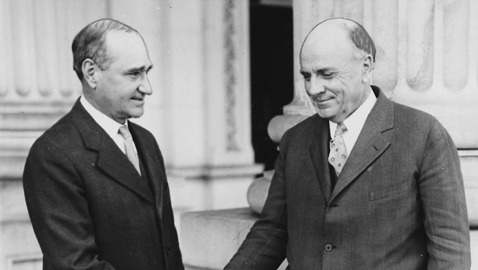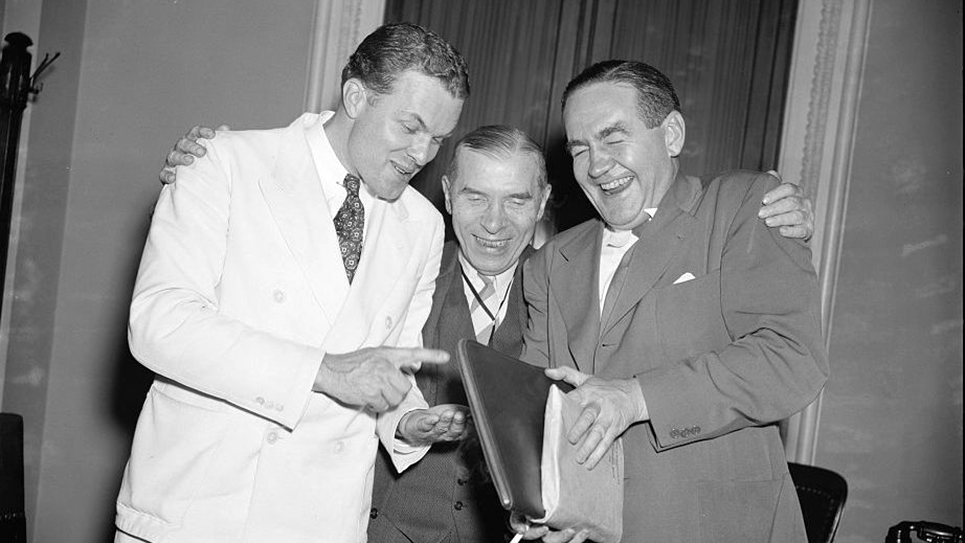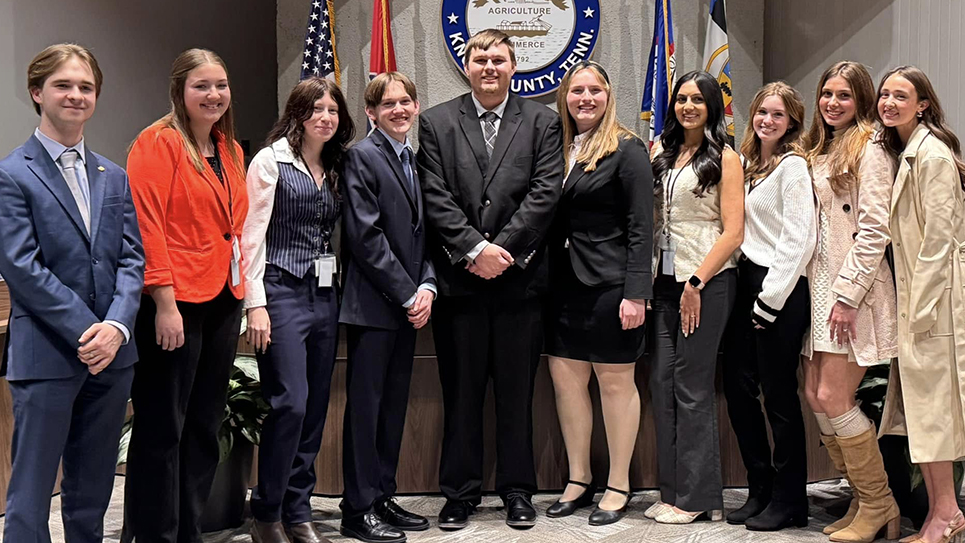For more than two decades, Finis James Garrett represented a West Tennessee district in Congress. Garrett was a talented politician and his rise was meteoric. Winning a seat in Congress when he was barely twenty-eight years old, he rose to become the Minority Leader of the U. S. House of Representatives.
Finis J. Garrett was born in Weakley County, Tennessee on August 26, 1875. At the age of eighteen, Finis Garrett was already the editor of a newspaper. Garrett did much of the work himself; reporting, as well as setting type and printing the paper. Garrett’s job with the newspaper enabled him to help pay for his education and after graduating from college, he became the principal of the Como Public School. He later accepted a position teaching for the Milan school system. While teaching, Garrett was furthering his own education, studying the law.
Finis J. Garrett passed the Bar examination in 1899 and by 1900, he was appointed Clerk and Master of the Chancery Court. Garrett’s appointment as Clerk and Master enabled him to earn a good living and in 1901 he married Elizabeth “Bess” Burns. Mr. and Mrs. Garrett had two children together; a daughter, Virginia, and a son, Burns.
In 1904, Garrett challenged incumbent Congressman Rice A. Pierce. Pierce had been a Confederate cavalry officer during the Civil War and had something of a spotty record in being able to hold on to his Congressional seat. Evidently Pierce had difficulty in entrenching himself; he had first been elected to the U. S. House of Representatives in 1882, but lost his reelection bid inside the Democratic primary two years later. Pierce came back four years later to win again in 1888. Pierce managed to hang on until 1892, when he lost again. Apparently Rice A. Pierce was nothing, if not determined. He waited another four years before running for his old seat in Congress and won the election of 1896.
Rice A. Pierce managed to remain in Congress for eight years before Finis J. Garrett challenged him in the Democratic primary. The old Confederate veteran attempted to paint Garrett as a mere callow youth, while he was an experienced and dedicated congressman, mature in years and wisdom. It did him little good. Finis J. Garrett won the primary and ended Congressman Pierce’s political career.
Garrett won the Congressional primary just weeks before his twenty-ninth birthday. He would remain in Congress until 1928 when he decided to run for the United States Senate.
Finis J. Garrett was profoundly conservative. Garrett was a strong supporter of states’ rights rather than almost any intervention by the federal government. Congressman Garrett was opposed to Congress granting suffrage for women, taking the position that each state should decide whether or not to allow women to vote. Garrett was similarly opposed to legislation protecting children in the work place. Congressman Garrett was even opposed to federal grants for road and highway construction, as he believed it would eventually lead to the federal government controlling state roads.
Finis J. Garrett’s inherent conservatism did not impede his ability to be elected by his fellow Democrats in the House of Representatives as Minority Leader. His two immediately predecessors had also been Southerners; Oscar W. underwood of Alabama and John Sharp Williams of Mississippi. After having served as Chairman of the House Insular Affairs Committee, he was the Democratic candidate for Speaker of the House in 1923. The Republicans held the majority inside the U. S. House of Representatives throughout the decade of the 1920s and every two years, Finis J. Garrett would be nominated for Speaker by his party. Garrett remained Minority Leader for the rest of his time in Congress.
Had he chosen not to run for the United States Senate in 1928 and opted to remain in the House, Finis J. Garrett quite likely could have been Speaker of the House in 1931. Evidently Garrett was either unhappy in the House, languishing in the minority, or yearned for other challenges. Had he been elected Speaker, much of history would have changed; John Nance Garner would not have been vice president under Franklin D. Roosevelt and considering Garrett’s conservatism, how would he have reacted to much of the New Deal?
Garrett had wanted a judgeship, but although a Democrat, President Woodrow Wilson refused to appoint the Tennessean. Wilson said Garrett was “our strongest man” in the House of Representatives and disliked the idea of losing him. Finally, Wilson relented and nominated Garrett to a federal judgeship, but the Republicans in the Senate refused to act upon the nomination.
In 1922, the House was seriously considering anti-lynching legislation sponsored by Missouri Republican Leonidas Dyer. Several Westerners in Congress believed the bill to be unconstitutional, including Senator William E. Borah of Idaho. Borah was one of the most respected members of the United States Senate, a progressive Republican considered something of a constitutional expert in Congress. The recalcitrant Westerners allied themselves with Southerners and Garrett told his colleagues, “Whatever you people in the West decide to do in working out your problem, we people of the South will understand.”
Tennessee politics was sharply divided during the decade of the 1920s. The Republicans had ceased to be a significant factor since the defeat of Governor Alfred A. Taylor in 1922. Austin Peay dominated the governor’s office and was allied with a faction of the Democratic Party headed by newspaper publisher and former U. S. senator Luke Lea. Opposed to Peay were Senator Kenneth D. McKellar, E. H. Crump, leader of the Shelby County political organization, and Nashville Mayor Hilary Howse. Howse headed the potent political machine inside Davidson County. Peay had been elected to a third two-year term over strenuous opposition from former State Treasurer Hill McAlister. McAlister had been supported by Senator McKellar, Crump, and Mayor Howse.
Many believed Governor Peay would challenge Senator McKellar inside the Democratic primary in 1928. A Peay candidacy would have been a real threat to McKellar, as the governor was highly popular, especially in much of East Tennessee where the senator was also very popular. McKellar was less popular in Middle Tennessee and the contest very well would have likely come down to West Tennessee.
Peay denied he was interested in running for the U. S. Senate in 1928 and fate made it a moot issue, as the governor died suddenly October 2, 1927 from a cerebral hemorrhage. He was only fifty-one years old. By that time, Congressman Finis J. Garrett had already announced that he was running for the United States Senate.
Issuing a statement from his hometown of Dresden on July 4, 1927, Garrett made the usual concession he had been urged to become a candidate by scores of citizens all across the State of Tennessee. Congressman Garrett announced he would challenge K. D. McKellar in the 1928 Democratic primary more than a year before the election.
Luke Lea had offered his support to Garrett, if for no other reason that he very much wanted Henry Horton elected governor. Lea figured if the Shelby and Davidson county political machines were busy trying to reelect McKellar to the Senate, they could not devote all their time, energy and resources into the gubernatorial race. Since Peay’s death, Speaker of the State Senate, Henry Horton had been the acting governor and while Lea had been highly influential during Peay’s administration, many considered the former senator chief executive in all but name during that of Horton.
Henry Horton had little political experience and was in his first term in the State Senate when his colleagues made him lieutenant governor. Horton had never run a statewide campaign and it appeared certain Hill McAlister would run again and considering that McAlister had quite nearly defeated Austin Peay, Lea knew the former Treasurer would be a formidable candidate. There was every reason to believe Hill McAlister would run an even stronger race against Horton.
Lea’s strategy was to keep McKellar, Crump, and Hilary Howse busy with the senatorial contest while he did all he could to elect Henry Horton governor in his own right.
Finis J. Garrett made several tours of Tennessee to introduce himself to thousands of Democrats who had either no or little knowledge of him. A thickset man, balding, yet stately, Garrett was an excellent speaker. The Congressman almost casually revealed the late Governor Peay had promised to support him in his senatorial campaign, but of course with Peay dead that same support was negligible.
Running against McKellar was an uphill battle for any aspiring politician. McKellar had defeated Lea and just about every other politician of note in Tennessee to get to the United States Senate to become the first U. S. senator ever popularly elected by Volunteer State voters. Senator McKellar quickly established a routine he kept up for the next thirty-six years. McKellar promptly answered all inquiries from Tennessee the same day they were received and performed innumerable favors for countless Tennesseans. Senator McKellar was well liked and respected by his constituents. He had earned a reputation for looking our for Tennessee and Tennesseans.
Finis J. Garrett and Kenneth D. McKellar were personal friends, a fact both readily acknowledged, yet their political philosophies were almost diametrically opposed to one another. Both had loyally supported President Woodrow Wilson and both were very much for American participation in the League of Nations. McKellar had been very strongly in favor of an amendment to the U. S. Constitution giving women the right to vote, an approach deeply opposed by Finis J. Garrett. Garrett was opposed to any effort to amend the Constitution to grant women suffrage.
Garrett was more supportive of big business than McKellar, who tended to view Wall Street and private power companies with deep suspicion. Finis J. Garrett was also not especially friendly to organized labor, while Senator McKellar considered himself a friend to labor.
Just before the primary election, Congressman Garrett came to Kingsport, where he spoke to an audience gathered at the Dobyns-Bennett High School. McKellar was quite strong in traditionally Republican East Tennessee and Garrett knew to win, he had to whittle down the senator’s expected margin in that section of the state.
Garrett flatly accused McKellar of being a tool of the Memphis machine, which he said was equaled “only by Tammany Hall and the Republican machine in Philadelphia” in the entire country. Congressman Garrett pointed out that while he considered McKellar a friend, they had very different ideas in approaching problems and legislation. “If McKellar is right on many issues,” Garrett said, “then I am eternally and forever wrong.”
The Congressman complained he had become “the target of labor leaders in Washington” due to his votes against organized labor in Congress. Garrett was sharply critical of McKellar for having voted for a bill regulating child labor. Once again, Garrett thundered such legislation belonged to the purview of the individual states. It was clear Finis J. Garrett believed Senator McKellar was something akin to a dangerous radical.
Garrett lamented McKellar’s refusal to debate him, noting sadly there had been a time when Tennessee senators had gladly defended their own records. The Congressman complained McKellar had not bothered to make a single speech since declaring himself a candidate for reelection. That had been McKellar’s speech in Gallatin, Tennessee opening his reelection bid.
McKellar was confident and had every right to be. When the votes were tallied, the senator beat Finis J. Garrett by a two-to-one margin. McKellar even ran quite strongly inside Garrett’s own Congressional district, carrying four of the nine counties comprising the Ninth District. McKellar won Davidson, Knox, and Hamilton counties; his majority inside his native Shelby County was ten to one.
Finis J. Garrett accepted his defeat with good grace and had not so bitterly attacked McKellar so as to offend the senator. That helped when Garrett was nominated to serve as a judge on the Court of Customs and Patent Appeals later that year by President Calvin Coolidge. This time the United States Senate confirmed Garrett’s nomination, which was strongly supported by Senator K. D. McKellar.
When Senator Lawrence D. Tyson died suddenly in the summer of 1929, Garrett was briefly mentioned as a possible appointee to the vacancy. The appointment would be made by Governor Henry Horton and the press speculated the most likely possibility was Luke Lea, followed by Finis Garrett and a few others. Some even believed Horton considered resigning as governor to allow his successor to appoint him to the senatorial vacancy. There was little reason to believe Finis J. Garrett would give up a comfortable lifetime appointment for the uncertainty of accepting a temporary appointment to the United States Senate. In the end, Governor Horton did appoint Lea, who imperiously rejected the appointment. Horton finally appointed Chattanooga candy maker and businessman William E. Brock.
Following his appointment to the Court of Customs and Patent Appeals, Finis J. Garrett and his wife continued to live in Washington, D. C. The former congressman would turn up at social events, especially those with some connection to Tennessee. Garrett would be present for several testimonials for Senator McKellar over the years.
Nominated to the bench by a Republican president, Garrett was nominated to serve as presiding judge of the Court of Customs and Patent Appeals in 1937 by President Franklin D. Roosevelt.
Finis J. Garrett remained on the court for twenty-five years, finally retiring on September 15, 1955, due to failing health. Garrett did return to Tennessee occasionally, but like so many other congressmen and senators, he lived in Washington, D. C. Even after retiring from the court, he and Bess did not return home to Tennessee.
On May 25, 1956, Finis J. Garrett died at his home in Washington, D. C.
He finally came home to Tennessee.







